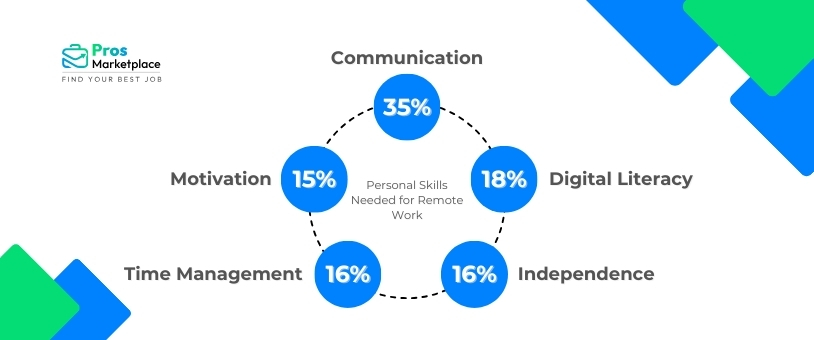Over the years, remote work has been progressively gaining recognition. When COVID-19 hit, organizations needed to adapt quickly, making remote work the brand new ordinary for everybody.
This shift has brought lasting changes to how we work, mainly for hiring managers and HR professionals. Now, they have to perceive and prioritize the vital talents for remote settings in the course of the hiring method, including the best skills for remote workers.
With a good sized 42% of the U.S. Workforce running from home complete-time, the distinction between work and domestic life is becoming less clear. This poses new demanding situations for each personnel and company.
Succeeding in a work-from-home setup requires a one-of-a-kind set of skills as compared to the beyond. Companies additionally need to regulate, as the skills valued five or ten years ago are not as applicable now. Hiring managers and HR groups need to understand the talents that contribute to productivity in a remote setting and also actively search for them.
Let us talk about the best skills for remote work and the abilities essential for achievement. Additionally, we will give tips on prioritizing those abilities in your hiring and recruitment methods.
30 Best Skills for Remote Work You Need to be Successful
Learning new skills is key to finding more opportunities. Let us explore practical and doable skills to make you better at remote jobs. Being good at what you do matters in today’s job market, and this list helps you get better at your work. As things change, being an expert in these simpler but useful skills is the foundation for success in remote work. Check out the skills below; they’re like stepping stones to stand out in remote jobs.
1. Programming
The digital world is evolving, and with an increasing number of businesses deciding on digitization, programming skills are in high demand. Programming languages bridge the space between businesses and customers in the virtual market through their devices. Therefore, whether you’re a beginner venturing into coding or an experienced professional looking for more career options, learning coding languages is a valuable asset in the global world dominated by technology.
How to start?
Begin your programming journey by exploring beginner-friendly online systems such as Codecademy, SoloLearn, or Geeks for Geeks. Start with the fundamentals, delve into documentation, and interact with coding groups that help you collaborate and expand your skills and experience in projects to build an impressive portfolio.
2. Digital Marketing
With organizations increasingly transitioning online to reach a broader audience, expertise in virtual advertising and marketing basics has become a necessity. Platforms like Google’s Digital Garage and HubSpot Academy offer accessible insights for beginners entering the arena of online merchandising, providing a reliable first step into the digital marketing world.
How to start?
Kickstart your digital advertising adventure by enrolling in free courses on platforms like Google’s Digital Garage and HubSpot Academy. Apply your understanding by experimenting with social media campaigns, diving into search engine marketing fundamentals, and exploring email advertising dynamics for hands-on experience. Help the brands expand by growing their reach and their online communities.
3. Graphic Design:
In our visually-driven world, graphic design skills are highly in demand, and there are numerous tools you can choose from. Beginning with foundational tutorials and progressing step-by-step to complicated tasks can help you become proficient at creating visually appealing content.
How to start?
Immerse yourself in beginner tutorials available on Adobe’s official website and other platforms like Canva. Develop your skills by creating simple designs, experimenting with various tools and features, and advancing to more elaborate projects as you build confidence in your graphic design abilities.
4. Web Development (e.g., HTML, CSS, JavaScript):
Web development skills are essential for creating engaging and interactive websites. Businesses are looking to connect with their users through online applications. So, learning HTML, CSS, and JavaScript forms a solid foundation for those entering the field.
How to start?
Initiate your web development journey by learning HTML and CSS for structuring and styling web content. Progress to JavaScript for interactivity. Utilize beginner-friendly resources like W3Schools, the Mozilla Developer Network, or freeCodeCamp to deepen your expertise and refine your web development skills.
5. Data Analysis (e.g., Excel, SQL)
The need for data-driven insights is continuously growing. As a result, mastery of tools like Excel and SQL has become critical for effective data analysis. Starting with the basics and gradually making your way to more advanced features equips you with the skills needed for interpretation and decision-making.
How to start?
Master Excel functions and pivot tables as a foundational step. Dive into SQL fundamentals for green database querying. Platforms such as Khan Academy and Mode Analytics provide beginner-friendly resources to guide you through the process of becoming proficient in data analysis.
7. Content Writing and Copywriting
Quality content serves as the basis of online engagement, making content writing and copywriting skills highly valued within the virtual realm. Enhancing your writing abilities through courses and real-world applications is vital for effective communication.
How to start?
Learn to curate professional content with courses on reliable platforms like Coursera, Skillshare, or Udemy. Practice by creating blog posts, articles, or marketing copy to refine your ability to deliver content that is engaging and yields results.
8. Cybersecurity Basics
As digitization increases, the world today is dealing with an increasing number of cyber threats, and expertise in cybersecurity basics is crucial for personal and organizational safety. Initiating your cybersecurity journey with introductory publications and hands-on events prepares you to navigate and mitigate potential risks effectively.
How to start?
Explore introductory publications on platforms like Cybrary, Khan Academy, or Udacity. Gain real-world experience through ethical hacking simulations and security challenges, fostering a foundational understanding of cybersecurity principles.
9. Social media management
In the virtual age, companies closely rely upon social media for brand visibility and purchaser engagement. Acquiring social media control talents is consequently critical for powerful online brand merchandising. You get to interact with human beings everywhere in the world and also add another properly sought-after ability to your resume.
How do I begin?
Get started on your social media control journey with the aid of exploring introductory courses on systems like Hootsuite, Buffer, or SocialBee. Gain realistic experience using coping with social media accounts, developing content calendars, and studying engagement metrics for treasured insights.
10. Search Engine Optimization
As online visibility takes a critical turn, studying search engine marketing abilities becomes critical for improving website ratings and increasing organic traffic. Starting with simple principles and imposing them on your platform offers hands-on experience and insight into powerful optimization techniques.
How do I begin?
Familiarize yourself with simple search engine marketing concepts through complete courses on structures like Moz, Yoast, or SEMrush. Apply those principles to your internet site or blog, analyze the results, and continuously refine your approach to living ahead in the dynamic subject of search engine marketing.
11. Video editing (e.g., Adobe Premiere Pro)
In a world dominated by using pretty engaging content, video editing skills, mainly with equipment like Adobe Premiere Pro, are increasingly treasured. Starting with novice tutorials and gradually moving in the direction of more complicated initiatives permits you to grasp the artwork of video editing.
How do I begin?
Start with the aid of newbie tutorials to be had on Adobe’s professional internet site, YouTube, or structures like Skillshare. Practice your skills by enhancing short clips, experimenting with transitions, and regularly advancing to more difficult video initiatives, enhancing your skill in video modification.
12. Project Management (e.g., Asana, Trello)
Efficient project control is critical for remote groups, facilitating organized collaboration and ensuring obligations are finished effectively. Utilizing gear like Asana and Trello and familiarizing yourself with their fundamentals guarantees smooth undertaking control.
How do I start?
Explore the primary functionalities of undertaking control equipment, inclusive of Asana and Trello, through their legit publications. Apply assignment management ideas by creating and coping with duties for private tasks, progressively expanding your skills, and adapting them to collaborative group environments.
13. Customer Relationship Management (CRM)
Building and retaining consumer relationships is a basic requirement for the success of a business, and CRM tools like Salesforce or HubSpot are broadly hired for this reason. Mastering the basics of CRM empowers you to effectively manipulate consumer statistics and enhance general client pleasure.
How do I begin?
Initiate your CRM adventure by exploring amateur publications supplied through these CRM platforms. Gain practical experience by organizing and handling consumer facts, learning the basics of sales pipelines, and regularly refining your CRM abilities through hands-on application.
14. E-commerce Management (e.g., Shopify)
With the exponential growth of online companies, e-trade control capabilities have become more and more valuable. Platforms like Shopify simplify the complex process of online saving control for corporations, making it an easily handy field for beginners.
How do I begin?
Start your e-commerce management journey by exploring Shopify’s beginner sources. Set up an easy online shop and hold close to the intricacies of product listings, price processing, and order success to gain complete information on e-trade control necessities.
15. Language Translation
In the globalized world, language abilities are fairly valuable, specifically for far-flung work and global conversation. Platforms like Duolingo provide amateur-friendly language courses, providing a reachable starting line for getting to know a brand-new language.
How do I begin?
Initiate your language learning with Duolingo’s amateur publications in a language of your preference. Practice through fundamental conversations, engage in expertly written content material, and steadily immerse yourself within the language to build proficiency and conversational talents.

Best Skills for Remote Work
Explore a diverse range of abilities that empower you to thrive in various domains. From technical prowess to creative finesse, discover the skills that define your capabilities.
1. UI/UX Design Basics:
User interface (UI) and user experience (UX) design are crucial for creating user-friendly products. Begin by understanding basic principles through courses on platforms like UX Design Institute or Interaction Design Foundation. Practice by redesigning simple interfaces or websites.
2. Virtual Assistance:
Virtual assistants are in demand for various administrative tasks. Familiarize yourself with common tools like Google Workspace or Microsoft Office. Start by offering assistance to friends or small businesses to gain practical experience.
3. Blockchain Basics:
Blockchain technology is gaining prominence. Start by understanding the basics through online courses on platforms like Coursera or Udemy. Explore blockchain networks like Ethereum to see practical applications.
4. Cloud Computing (e.g., AWS, Microsoft Azure):
Cloud computing is integral for remote data storage and management. Begin by learning the basics of cloud platforms like AWS or Microsoft Azure through their official documentation. Explore virtual machines and cloud storage services.
5. Remote Communication Tools:
Effective communication tools are essential for remote teams. Familiarize yourself with platforms like Zoom, Slack, or Microsoft Teams. Practice by participating in online meetings, messaging, and collaborative document editing.
6. 3D Printing Basics:
As 3D printing becomes more accessible, basic skills in 3D modeling and printing are valuable. Start by exploring beginner tutorials on platforms like TinkerCAD. Practice by creating simple 3D models and printing them using online services.
7. Augmented Reality (AR) and Virtual Reality (VR):
AR and VR skills are becoming relevant in various industries. Begin by understanding the basic concepts through online resources. Explore development platforms like Unity for hands-on experience in creating simple AR or VR applications.
8. Health and Wellness Coaching:
Remote work emphasizes well-being. Consider health and wellness coaching skills. Start by taking courses on platforms like Udacity or ACE Fitness. Practice by creating personalized wellness plans for yourself or others.
9. Podcast Production:
Podcasts are a popular medium. Learn the basics of podcast production using tools like Audacity or GarageBand. Practice by creating and editing your podcast episodes.
10. Agile Methodology:
Agile methodology is widely used in project management. Begin by understanding Agile principles through online courses on platforms like Scrum.org or Agile Alliance. Apply Agile concepts in managing personal projects or collaborating with others.
11. Remote Teaching and Tutoring:
With the rise of online education, teaching, and tutoring skills are valuable. Explore platforms like Khan Academy or Outschool for teaching resources. Start by tutoring in a subject you are proficient in to gain experience.
Personal Skills Needed for Remote Work
In remote work, having the right personal skills is super important. This part, “Must-Have Personal Skills for Remote Work,” talks about the basic qualities you need to do well in remote jobs. It’s not just about technical stuff; it’s about being disciplined, good at communicating, and adapting easily. Getting these personal skills down is crucial for success in remote work, where being responsible and independent matters a lot. Check out the tips below – they’re like the essential personal skills toolkit for thriving in the world of remote work.
More Skills to Get Remote Work
Navigating the ever-evolving terrain of remote work demands a toolkit of diverse skills. This segment, “Enhance Your Remote Potential,” zeroes in on practical and achievable skills that can elevate your performance in remote settings. Standing out in your field is crucial in the competitive job market, and this curated list serves as a compass for honing and refining your abilities. As the professional landscape continues to transform, becoming proficient in these straightforward yet valuable skills becomes the bedrock for thriving in remote work scenarios. Dive into the array of skills below; they’re the building blocks for establishing your mark in remote work excellence.
Also Read: Most in-demand skills for remote jobs
- Cybersecurity
- Mobile App Development
- Podcast Editing
- Social Media Analytics
- Data Visualization (e.g., Tableau)
- Cryptocurrency Trading
- Network Administration
- Machine Learning Basics
- Technical Writing
- Drone Operation
- Video Game Development
- Chatbot Development
- Email Marketing
- Financial Analysis
- Influencer Marketing
- UX/UI Prototyping
- Remote Event Planning
- Crisis Management
- Legal Research
- Cryptocurrency Investing
- Basic Graphic Design
- Online Research
- Email Communication
- Social Media Posting
- Simple Data Entry
- Document Formatting
- Online Survey Creation
- Customer Support Chat
- Online Calendar Management
- Online Language Tutoring
Conclusion
In the dynamic landscape of remote work, honing a diverse skill set is not just an advantage – it’s the secret sauce for success. This exploration of “Pros Marketplace Best Skills for Remote Work” has unveiled a spectrum of practical and attainable skills crucial for excelling in the virtual realm. Whether you’re navigating the technical intricacies or fostering essential personal attributes, these skills act as a compass, guiding you through the challenges of remote work.
As the professional world continues to evolve, staying ahead necessitates continuous learning and adaptation. Being at the forefront of these best-in-demand skills positions you not only as a valuable asset in the job market but also as a remote work maestro. It’s not just about the job; it’s about a fulfilling and thriving remote work experience with the right skills.







